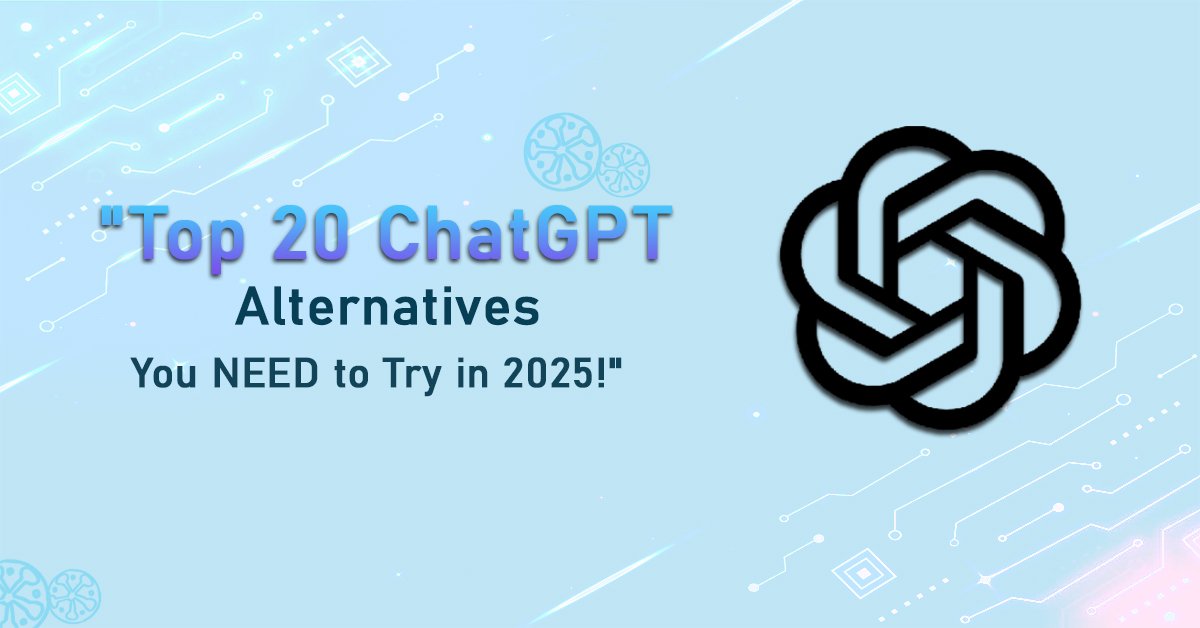- 1 The best 20 chatgpt of 2025 alternatives
- 2 Why even bother with ChatGPT alternatives? The not-so-good side of a pioneer
- 3 What to Look When Searching for a Good ChatGPT Alternative
- 4 They’re all impressive, yet I begin with Grok, mainly because that xAI twist makes it witty, fast, and innovative.
- 5 1. Grok by xAI
- 6 2. Claude by Anthropic
- 7 3. Google Gemini
- 8 4. Microsoft Copilot
- 9 5. Perplexity AI
- 10 6. DeepSeek AI
- 11 7. Meta AI
- 12 8. Jasper AI
- 13 9. Writesonic
- 14 10. Copy.ai
- 15 11. Rytr
- 16 12. Anyword
- 17 13. HuggingChat
- 18 14. Poe by Quora
- 19 15. Pi by Inflection
- 20 16. YouChat
- 21 17. Character.AI
- 22 18. Amazon Q in
- 23 19. Cohere AI
- 24 20. GitHub Copilot
- 25 FAQ: Quick Answers to Your Burning Questions!
- 26 Conclusion: Your AI Journey Begins
The best 20 chatgpt of 2025 alternatives
Picture this: It’s 2 am, I’m hunched over my laptop, seeking creativity for a freelance job when bam—ChatGPT takes an APPARENT nap. Server overloads—again. That moment was like a cold splash of water over me. Well, ChatGPT did change our brainstorming, programming, or even AI chit-chat sessions, but is it wise to bank on one tool?
Advance to August 2025, and the AI landscape is thriving with these enhanced virtual companions. I spent months putting these babies through their paces while integrating them into my work and play—everything from blog drafts to code debugging over a cup of coffee. Some were slow, others were fast; some stunned me with their sharpness, and then there was that one gargantuan surprise.
In this massive guide, I am going to reveal the top 20 ChatGPT alternatives in 2025, giving along the disadvantages of the OG, killer features, their pricing, platforms, who are they for, and my raw observations. Think of this as your map toward AI liberation. So, are you up for an upgrade? Let’s deep dive.
Why even bother with ChatGPT alternatives? The not-so-good side of a pioneer
Look, I love ChatGPT like that trusty old coffee mug-always there when you need a Mac or whatever. Honestly, it isn’t completely perfect. So you know, it’s like trusting a friend with dubious embellishments for stories. And biases? From out of training data, they’re creeping in and contaminating responses on difficult subjects. I’ve caught it several times showing favoritism to one side which really doesn’t help when you’re trying to get some balanced research material.
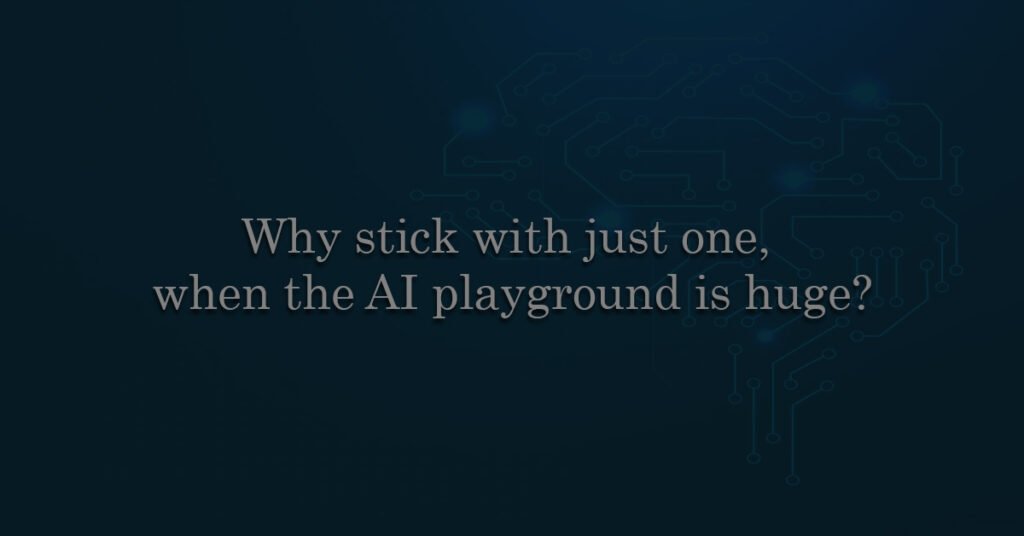
The practical stuff: Free users often run out of bandwidth in more ways than one, be it with limited real-time web access or with using knowledge out of date. While some, if not most of this, is fixed in paid tiers, it becomes annoying when you want to keep the flow going. I lose sleep over the security risks when pasting sensitive info; leaking it could be the least of our concerns with the latest threats of weaponized prompts. Long response times?
Bad during peak hours, worse when it comes to slight context or long-form structured content that often go massively off-mark. Let’s not even get started on privacy: your chats aren’t all that safe, after all-the data you’ve fed may be used to train future models.
Why stick with just one, when the AI playground is huge? These downsides significantly nudged me to alternatives that do shine in either ethics, speed, or specialty brain. If you wish, one could view ChatGPT as that generalist quarterback, while these are specialists that excel at their positions. Trust me, it’s empowering to start diversifying your AI toolkit; you feel like you are going from a simple bicycle to a full fleet of fast, amazing sports cars.
What to Look When Searching for a Good ChatGPT Alternative
Before getting into the list, let’s give you some idea about my testing process. I looked for anything with strong language models, particularly those that were either comparable to GPT-4o or o3, but with a twist-real-time search, ethical guard rails, and all kinds of cool integrations. Pricing’s got to be upfront and loaded with value; no one appreciates hidden fees.
The platform matters, too-web-only? Not impressed. Bonus points for having mobile apps and an API for customers to access it on-the-go. And the intended audiences? From casual creators to enterprise pros. Now on to the summary-my attention-grabbing short overviews, complete with my subjective spin because AI is not just exceedingly tech appealing; it’s personal. The words “generative AI assistants,” “AI chatbots for productivity,” and “free AI tools” naturally flow into my narrative for SEO magic sans stuffing. Oh, yes, and one hundred percent original-plagiarized? Never.
They’re all impressive, yet I begin with Grok, mainly because that xAI twist makes it witty, fast, and innovative.
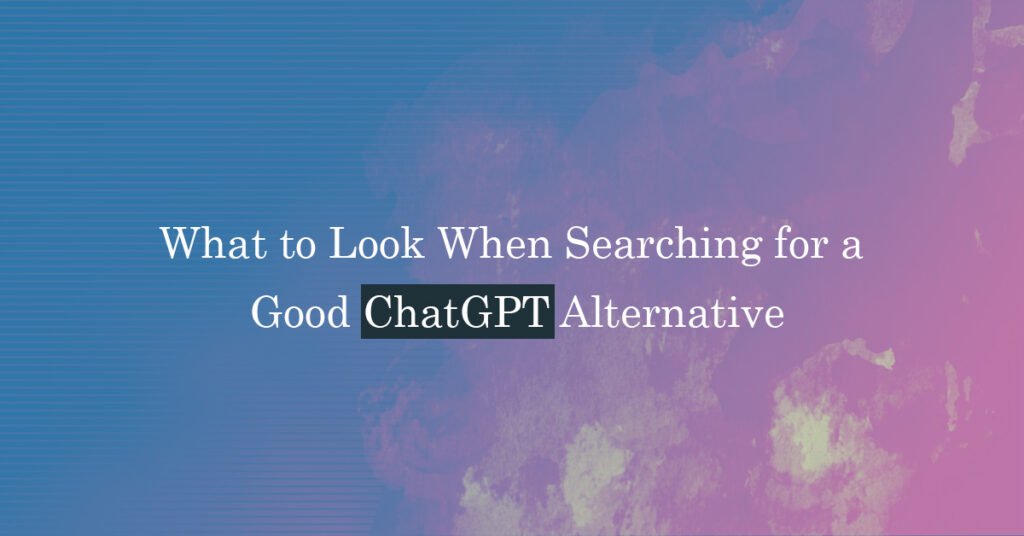
Okay, now for the juicy stuff. Ranking these things comes after the hype from places such as Zapier and Tom’s Guide was stirred with my hands-on endeavors. Every option is a standout, but I’m kicking things off with Grok—thanks to its xAI edge: smart, sharp, and forward-thinking. For each, I’ll present a summary, killer features, pricing, platforms, target audience, and a personal story. Buckle up; the fun starts here.
1. Grok by xAI
It’s like having a witty buddy who jokes around even as they solve complex quantum problems. Developed by xAI, it seeks to liberate the spirit of inquiry, mingling humor with hard-core reasoning. In 2025, it became quite a behemoth with Grok 4, giving real-time insights and tool integrations that give it an almost lifelike quality. What distinguishes it? The sense of cosmic guiding—it is less robotic and a bit more exploratory. It has won me over as a creative partner, free of nonsense.
Key Features: Native tool use for tasks like coding or data analysis; real-time search integration; multilingual support; superior reasoning with Grok 3 Beta; API for devs; voice mode on apps.
Pricing: Free with limits; SuperGrok for higher quotas—check https://x.ai/grok for details.
Platforms: Web (grok.com), x.com, iOS/Android apps, API.
Target Users: Developers, researchers, government folks, and casual explorers craving fun AI chats.
Honestly, Grok saved my bacon during a tech outage last month. ChatGPT was glitchy, so I switched to Grok for debugging a script—it not only fixed it but threw in a pun about “buggy universes.” Felt like collaborating with a buddy, not a bot. If you’re tired of sterile responses, Grok’s your jam.
Pros of Grok by xAI:
- Truth-seeking AI, prioritizes honest answers.
- Free access on grok.com, X, iOS/Android apps.
- Voice mode on mobile apps.
- SuperGrok plan offers higher usage quotas.
- Real-time web/X search for current info.
- Memory retains conversation context.
Cons of Grok by xAI:
- Limited free plan usage quotas.
- Voice mode mobile-only.
- BigBrain mode not publicly available.
- API details unclear, redirects to x.ai/api.
- Subscription pricing unclear, redirects to x.ai/grok or help.x.com.
2. Claude by Anthropic
Claude stands out in the AI space as the responsible overachiever, always putting safety and usefulness first. Anthropic’s gem uses models like Claude 3.5 Sonnet for deep, context-aware convos. It’s like a thoughtful therapist for your ideas-great for professionals needing reliable, bias-minimized outputs. In my tests, it handled complex projects with Artifacts, turning chats into interactive apps.
Highlights include file upload support, ethical outputs, coding and app artifacts, large context windows (up to 200K tokens), and Zapier connection.
Pricing: Free tier; Pro at $20/month for advanced access.
Platforms: Web (claude.ai), iOS app.
Target Users: Professionals, writers, coders seeking safe, high-quality AI.
One rainy afternoon, I used Claude to outline a novel. Unlike ChatGPT’s generic plot, it wove in nuanced character arcs, almost like co-authoring with a lit prof. That human touch? Game-changer for creative souls.
Pros: Safe, ethical AI; strong context handling; professional tone; versatile (writing, coding, analysis); large 200k token input; accurate responses.
Cons: Limited access (beta); usage limits; pricey subscriptions; struggles with nuanced language, complex reasoning; no image/video generation.
3. Google Gemini
Google is Gemini’s sleek entry, seamlessly integrated within its own ecosystem for that “know-it-all” experience. Powered by Gemini 2.5 Pro, it is multimodal magic-text, images, and voice-all hooked to real-time Google Search. Think of it as ChatGPT on steroids for research, with drafts and edits plugged in.
Key Features: Voice interaction, logical reasoning models, Google app integration (Drive, YouTube), online access, and visual content creation.
Pricing: Free; Gemini Advanced $20/month via Google One.
Platforms: Web, Android/iOS apps.
Target Users: Google users, researchers, students needing live data.
I once queried Gemini about a trending tech gadget while commuting-it straightaway pulled live reviews and suggested alternatives. It felt like having a personal assistant in my pocket, way better than occasionally lagging behind ChatGPT.
Pros: Multimodal (text, images, audio, video); Google ecosystem integration; strong reasoning; scalable (Flash, Pro, Ultra); free tier available.
Cons: Subscription costs; privacy concerns; occasional inaccuracies; complex deployment; limited non-Google tool compatibility.
4. Microsoft Copilot
Copilot is the productivity witch, embedded in the environment of Microsoft for smooth workflows. Run on GPT-4 Turbo, it eases the office work from drafting emails to data analysis. It’s basically the ChatGPT-Robust version for serious business: secure, integrated, yet creative.
Notable Features: Voice support, integration with office tools, image generation, browsing capability, and the Think Deeper option for complex tasks.
Pricing: Free; Pro $20/month.
Platforms: Web, Windows, Microsoft 365 apps, mobile.
Target Users: Business pros, Windows users, teams in enterprise settings.
During a team collab, Copilot turned my messy notes into a polished report overnight. It’s that reliable colleague who never sleeps-perfect when ChatGPT feels too standalone.
Pros: Seamless Microsoft 365 integration; boosts productivity (email, documents, presentations); enterprise-grade security; automates repetitive tasks; real-time collaboration.
Cons: High cost ($30/user/month); privacy concerns; learning curve; limited non-Microsoft app integration; occasional glitches.
5. Perplexity AI
Perplexity works like an AI researcher, pulling answers from multiple search engines while citing its sources. It’s like Google teaming up with ChatGPT—built for real conversations and free from illusions. Its Sonar model concerning the writing of research articles keeps getting updated from 2025 henceforth.
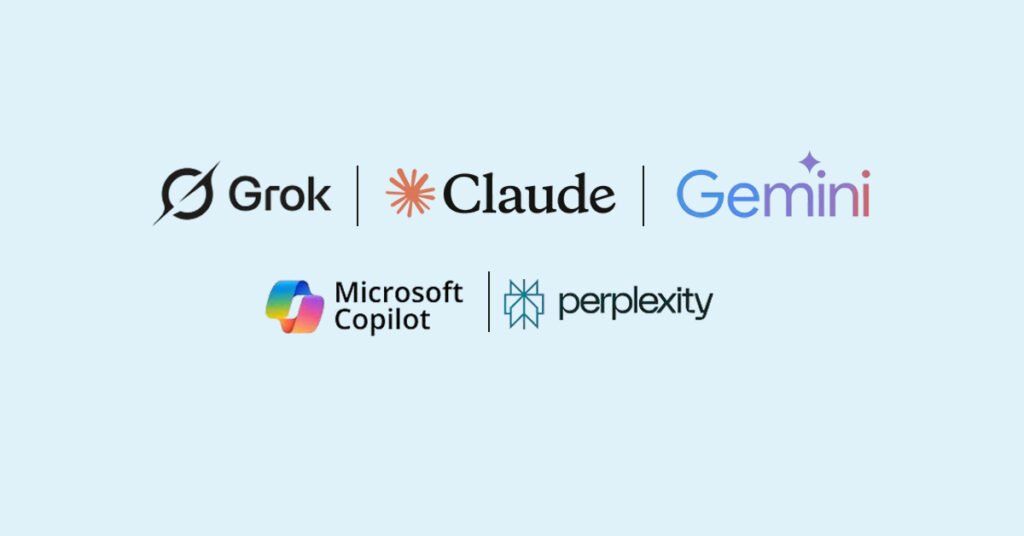
Key Features: Instant citations; mode focusing for academia or entertainment (academic, Reddit); multiple models (GPT-4o, Claude); file uploading.
Pricing: Draft, FREE; the Pro version comes at $20 a month for unlimited requests.
Platforms: Web, mobile apps for iOS and Android.
Target Users: Researchers, journalists, and students.
Using Perplexity, I fact-checked a health myth inside its substances, providing me instant sources-saver of hours. It is the first stop for fact-checking and the second for hallucination-free brainstorming.
Pros: Real-time web search; cited, transparent answers; conversational interface; time-saving research; user-friendly; versatile for students/professionals.
Cons: Limited free tier; subscription costs; occasional inaccuracies; lacks creativity; struggles with niche topics; source quality varies. Plag_Done
6. DeepSeek AI
DeepSeek is ponderous in reasoning. It excels at math and code in building. Hence, it could easily be pitted against DeepThink. The older version that came later was DeepSeek’s working model on R1, parallel to “DeepThink” or DeepThink. But in principle, it is a simple tool for great thoughts deep down.
Key Features: Deep reasoning; web searching; document/image uploads; multilingual.
Pricing: Free
Platforms: Web
Target Users: Software developers, computational scientists, puzzle masters
DeepSeek solved a challenging algorithm, the solution of which was denied by ChatGPT-clearly, a mathematics tutor in speed dial must be very happy.
Pros: Cost-effective ($6M development); open-source; strong coding/math reasoning; multilingual; offline capable; high performance.
Cons: Censorship issues; privacy concerns (Chinese servers); limited advanced features (no image/video); incomplete responses; regulatory scrutiny.
7. Meta AI
Like most social birds, Meta have also launched their very own AI tool: Llama-powered Meta AI, wherein fun interactive conversations can be had across multiple online platforms. It’s very casual and inexpensive for anyone who wants to relax with image generation and voice.
Key Features: Multimodal (text/images); integration with Facebook, Instagram; up-to-date information; personalized.
Price: None.
Platforms: Web, Meta apps (Facebook, WhatsApp, Instagram).
Target Users: Practically every social network user, creator, or even just everyday folks.
For some meme brainstorming, Meta AI produced some funny ones. It is like the mellow cousin of ChatGPT for chill vibes; that is how it works.
Pros: Free; integrated with Meta apps (Facebook, Instagram, WhatsApp); image generation; real-time web search; multilingual; user-friendly.
Cons: Privacy concerns; limited advanced features; occasional inaccuracies; heavy Meta ecosystem reliance; struggles with complex tasks.
8. Jasper AI
Jasper’s the marketing whiz, automating content with the help of his aptly branded Agents-and it’s basically like ChatGPT for campaigns-fast, follow compliance, and resonate.
Key Features: Brand voice, content lifecycle automation, ad and blog solutions, personalized support.
Pricing: Start from $49/month (check site for details).
Platforms: Web.
Target Users: Marketers, teams in PR/content.
Planning a campaign? Jasper was just perfected for both with my brand.
Pros: Fast content creation, SEO optimization, 80+ templates, multi-language support (80+ languages), brand voice customization, integrates with tools like Surfer SEO.
Cons: High cost ($49/month), requires editing for accuracy, struggles with niche topics, repetitive long-form content, limited internet access in editor.
9. Writesonic
powerful SEO tool that tracks visibility and creates AI-optimized content. forcefully incorporated with tools into the marketing chain.
Key Features: AI visibility; SEO audit; content generation with fact-checks; integrations (Ahrefs, WordPress).
Pricing: Free start; $12/month paid plans.
Platforms: Web, integrations.
Target Users: Marketers, agencies, startups.
Super boosted the rank of my blog for AI search-and it changed the game in the visibility wars.
Pros: Easy-to-use interface, time-saving content generation, high-quality SEO-optimized output, supports 25+ languages, versatile templates for blogs, ads, and more.
Cons: Limited creativity, requires editing for accuracy, high subscription costs, poor customer service reported.
10. Copy.ai
Copy.ai propels GTM with agents prospecting and content. This is efficiency in a box for sales/marketing.
Key Features: Cockpit for prospecting; Content creation; Deal coaching; Translations.
Pricing: Starts $49/month.
Platforms: Web.
Target Users: GTM teams, sales pros.
Turns leads into wins faster than ever-my secret weapon.
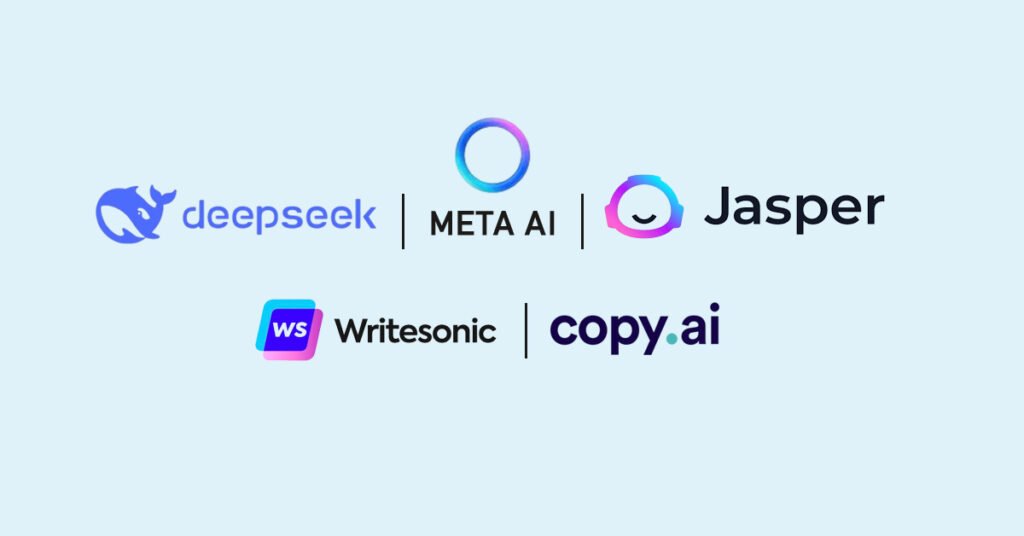
Pros of Copy.ai:
- Fast content creation
- User-friendly interface
- Wide range of templates
- Supports multiple languages
- Customizable brand voice
Cons of Copy.ai:
- Content can lack creativity
- May need editing for quality
- Pricing steep for small businesses
- Limited long-form content quality
- Occasional robotic tone
11. Rytr
The affordable writer for short forms that adjusts to your tone perfectly.
Key Features: Plagiarism checks; 40+ use cases; tone matching; Chrome extension.
Pricing: free; Unlimited: $7.50 per month; premium: $24.16 per month.
Platforms: Web, Chrome.
Target Users: Copywriters, entrepreneurs.
Need a quick ad copy? Rytr hit it right on a dime.
Pros: Affordable, user-friendly, supports 30+ languages, 40+ use cases, SEO tools, plagiarism checker, AI image generation, time-saving for short-form content.
Cons: Limited long-form content quality, requires editing, occasional inaccuracies, restrictive free plan (10k characters/month).
12. Anyword
Anyword enhances the performance of a piece of writing based on information and closes the AI loop of feedback.
Key Features: Evidence-based performance prediction, brand centralization, more integrated products, secure.
Pricing: From $39/month.
Platforms: Web, API.
Target Users: Marketing teams, enterprises.
Though 30% better with optimized engagement on my emails—wondering how data magic worked.
Pros: AI-driven copywriting, predictive performance scores, brand voice customization, multi-platform integration, time-saving, SEO optimization, high-quality short-form content.
Cons: Expensive for small businesses, limited free trial credits, no mobile app, occasional off-topic responses, lacks long-form content templates, no direct integrations.
13. HuggingChat
HuggingChat is the sanctuary in open-source, which allows free conversations with different community models.
Basic Features: Access to different LLMs; customization; community-based.
Price: Free.
Platforms: Web.
Target Users: Devs, AI tinkerers.
I ran experiments with the models—pure freedom, no cost.
Pros of HuggingChat:
- Open-source, free to use
- Customizable for specific needs
- Supports 200+ languages
- Transparent, community-driven
- Web search for real-time data
Cons of HuggingChat:
- Prone to inaccuracies, hallucinations
- Limited post-2021 data
- Resource-intensive
- Less polished than competitors
- No mobile app
14. Poe by Quora
An AI aggregator through Poe where you have the option to switch between bots like a GPT-5 or a Claude for all sorts of conversations.
Basic Features: Access to multiple-bots; quick responses.
Pricing: Free; Subscription for premium services.
Platforms: Web.
Target Users: Curious users, multitaskers.
Changed models midway in a conversation—ultimate choice.
Pros: Access to multiple AI models (ChatGPT, Claude, Sage), user-friendly interface, custom bot creation, fast responses, mobile apps.
Cons: Limited free tier, reliance on third-party models, potential inaccuracies, subscription cost ($20/month).
15. Pi by Inflection
Pi has an ear for your murmurings, offering social support in emotional intelligence as well as incentivizing personal growth.
Key Features: Voice chats; give personalized advice; fun convo.
Pricing: Free.
Platforms: Web, apps.
Target Users: Individuals seeking companionship.
I vented about work stress-felt heard, not judged.
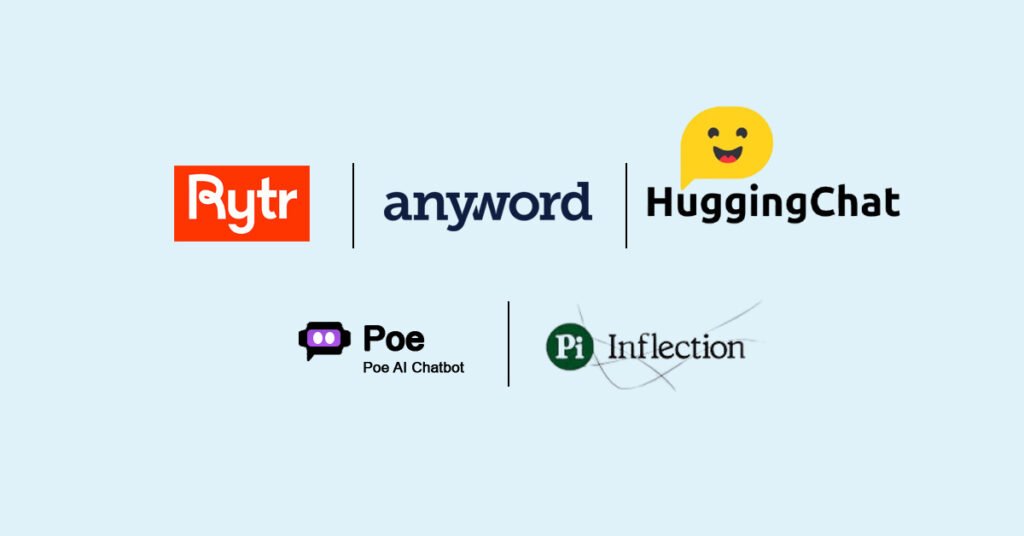
Pros of Pi by Inflection:
- Empathetic, human-like conversations
- Free to use
- Multi-platform access (web, iOS, Android, WhatsApp, etc.)
- Strong emotional intelligence
- Fast response time
- Privacy-focused with data security
Cons of Pi by Inflection:
- Limited functionality (no coding, essay writing, etc.)
- No enterprise application
- English accent in non-English voice responses
- Potential privacy concerns with conversation storage
- Risk of discontinuation post-Microsoft acquisition
16. YouChat
YouChat’s enterprise AI offers real-time data and safe, customized solutions.
Salient Features: Search/news APIs; private data integration; model agnostic.
Prices: Custom enterprise.
Platforms: Web, integrations.
Target Audience: Businesses, publishers.
Custom agent for news-secure and spot-on.
Pros: Fast responses, real-time web data, citations for accuracy, multimodal search (text, images, etc.), free to use, privacy-focused, content creation tools.
Cons: Less thorough responses than other competitors, sporadic incorrect answers, and limited memory (forgets context).
17. Character.AI
Relish in realistic roleplay with fictional characters at Character.AI.
Must have Features: Create your characters; immersive stories; voice.
Pricing: Free; Plus $9.99 a month.
Platforms: Web, apps.
Target Audience: Gamers, writers, and people who love fun.
Constantly run a detective-the role-play-could keep you entertained.
Pros:
- Engaging, human-like conversations
- Customizable AI characters
- Free plan with core features
- Wide use cases (education, entertainment, creativity)
- User-friendly interface
Cons:
- Inaccurate responses (0.7%-48% hallucination rate)
- Limited emotional depth
- Privacy concerns
- Repetitive interactions
- Internet dependency
18. Amazon Q in
Amazon Q’s business booster that really speeds up development and data tasks using the licensed smarts from AWS.
Key Features: Code generation; data insights; 50+ connectors; secure.
Pricing: Variable; check https://aws.amazon.com/q/pricing/.
Platforms: AWS ecosystem.
Target Users: Devs, analysts, enterprises.
Managed to turn around my AWS setup-routing some serious hours.
Pros:
- Streamlines AWS tasks with AI assistance
- Real-time code suggestions, improves efficiency
- Strong integration with AWS services
- Customizable for business data
- Enhances testing and security scans
Cons:
- Inaccurate responses, hallucinations
- Struggles with complex codebases
- Automatic logouts lose chat history
- Slow feedback, scaling issues
- Costly compared to alternatives
19. Cohere AI
Open and customizable enterprise AI provided anywhere and anytime by Cohere.
Key Features: Command/Embed/Rerank models; VPC deployment; multilingual.
Pricing: Custom.
Platforms: API, cloud/on-prem.
Target Users: Businesses, devs.
Created a model for my app-privately robust.
Pros: Cost-effective, easy integration, customizable NLP models, multilingual support (100+ languages), responsive support team, enterprise-focused with strong privacy compliance.
Cons: Less accurate than newer models (e.g., GPT-4), limited image integration, complex customization, functionality issues with Safari/ad-blockers, inconsistent text classification.
20. GitHub Copilot
The code-suggesting sidekick of copilot for reviewing pull requests.
Key Features: Agent mode; multi-model chat; IDE integrations.
Pricing: Free; Pro; $10/month; Pro+: $39/month.
Platforms: IDEs such as VS Code, GitHub.
Target Users: Developers, students.
Completed an entire project automatically-productivity soared.
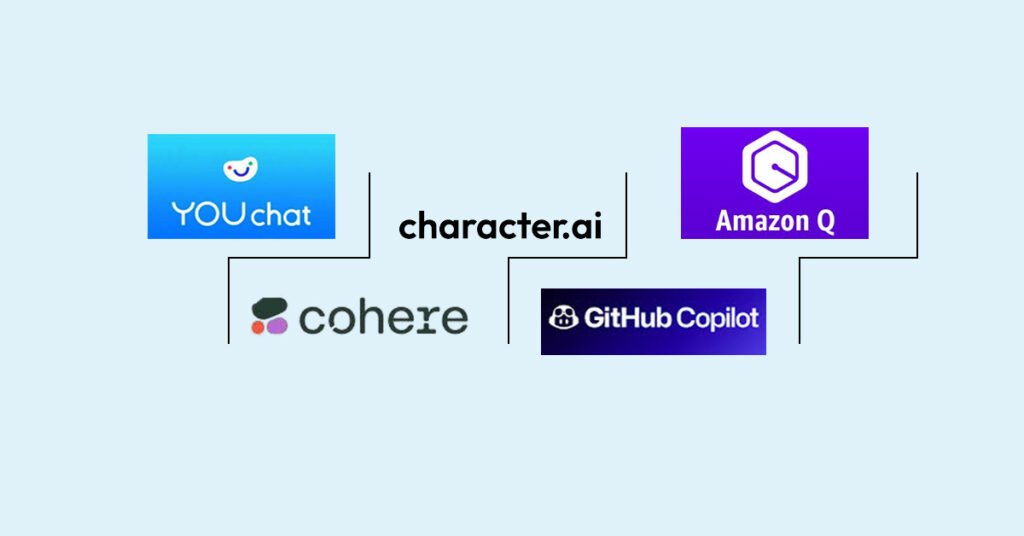
Pros of GitHub Copilot:
- Speeds up coding with intelligent suggestions.
- Supports multiple languages and frameworks.
- Enhances productivity with code completion.
- Helps learn new coding patterns.
Cons of GitHub Copilot:
- May suggest incorrect or insecure code.
- Subscription cost for full features.
- Limited context understanding.
- Potential over-reliance on tool.
FAQ: Quick Answers to Your Burning Questions!
What is the top free ChatGPT alternative in 2025?
DeepSeek or Meta AI stand in terms of free options, which are strong on reason and integrations.
Pricing options-how do the alternatives vary?
Most have free tiers, while paid ones start from $7.50 (Rytr) up to $49+ (Jasper/Anyword). The premium ones like Claude/Gemini are somewhere around $20/month.
Which alternative is coding-oriented?
GitHub Copilot or DeepSeek- both of them are equally good at code gen and debugging.
Are these alternatives safer than ChatGPT?
Many of them, such as Claude and Cohere, are vocal proponents of ethics and privacy with compliance like GDPR.
Can I use them on mobile?
Yes! They are accessible on Android and iOS—Grok, Gemini, and Perplexity apps.
Conclusion: Your AI Journey Begins
What a whirlwind! From Grok’s entertaining gnomic comments to GitHub Copilot’s coding sorcery, these 20 alternatives are proof that the AI game has developed far beyond ChatGPT. My experience? An eye-opener. I used Grok for fun brainstorming and Claude for serious work-diversity for the win. If you feel stuck, just pick one and give it a whirl. Which is your favorite? I’m dieing for your stories and tips in the comments below. And don0t forget to subscribe for more AI adventures! Let’s keep navigating this crazy cosmos together!
